Tidal vs Amazon Music: Which is Better in 2025

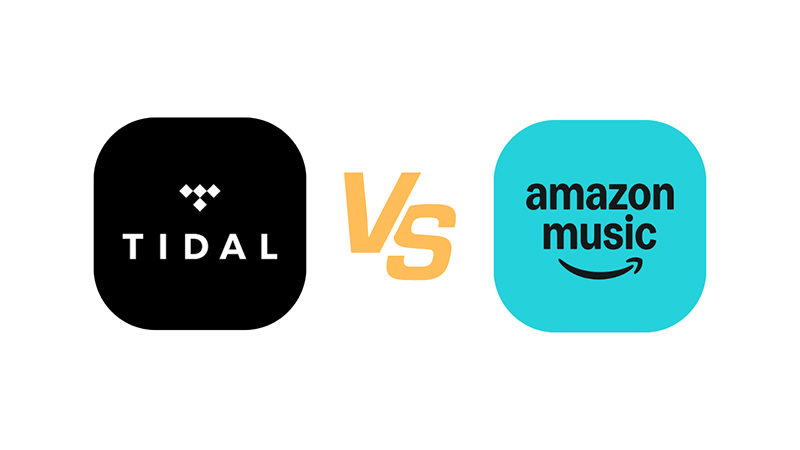
Who doesn’t love listening to music while going to work or relaxing at home? Music apps make it easy, but choosing the right one can be confusing. Many people ask which is better: Tidal vs Amazon Music. Both apps offer great songs and features, but they are different in some ways. Some people want the best sound, while others care more about price or ease of use. In this guide, we’ll look at both Tidal and Amazon Music to help you decide which one fits your music needs better.
Tidal vs Amazon Music: Basic Comparison
With so many music streaming services available today, choosing the best one can feel confusing. Many people compare Tidal vs Amazon Music because both are top options with strong features. If you’re serious about music, you may want the best sound. Or maybe you care more about song variety, easy access, or price. That’s why it’s helpful to compare Tidal and Amazon Music to see which one fits your lifestyle and listening habits better.
What is Tidal?
Tidal is a music streaming app known for its high-quality sound and focus on artists. It offers more than 100 million songs and hundreds of thousands of music videos. Tidal supports HiFi (CD-quality) and high-resolution FLAC audio (up to 24-bit/192 kHz), plus formats like Dolby Atmos and 360 Reality Audio. In 2024, Tidal simplified its pricing, offering one plan at $10.99 per month that includes all top-quality audio features.
What is Amazon Music?
Amazon Music is a streaming service by Amazon, offering access to over 100 million songs and a large collection of podcasts. It includes different plans: Amazon Music Free, Prime Music (included with Prime), and Amazon Music Unlimited. Unlimited now includes HD and Ultra HD audio for free, supporting up to 24-bit/192 kHz FLAC audio. It works especially well with Alexa devices and is affordable at $9.99 per month or discounted for Prime members.
Comparison Table: Tidal vs Amazon Music
Tidal vs Amazon Music: Detailed Comparison
1: Price & Subscription Plans
Tidal offers a single subscription plan at $10.99/month for individual users, with family and student discounts available, delivering all Hi‑Res features in one tier. Comparing amazon music unlimited vs tidal, Amazon Music Unlimited now costs $11.99/month ($10.99 for Prime members), with family plans at $19.99/month and student pricing ~50% off.
The pricing of amazon music unlimited vs tidal shows Amazon gives more flexible plans like single-device ($4.99), standard, family, and student, often cheaper if you’re already a Prime member.
2: Audio Quality & Hi‑Res Formats
Tidal HiFi provides CD-quality FLAC at ~1411 kbps, and HiFi Plus (Max) offers 24‑bit/192 kHz FLAC (up to ~9216 kbps) with support for Dolby Atmos and 360 Reality Audio. In the Amazon Music hd vs tidal sound quality debate, many users report Tidal sounds more warm and natural, with richer dynamics compared to Amazon’s Ultra HD.
MQA support was discontinued by mid‑2024.
Amazon Music HD/Ultra HD included with Unlimited supports lossless streaming up to 24‑bit/192 kHz FLAC (~3730 kbps), and also includes spatial formats like Dolby Atmos and 360 Reality Audio. While Amazon Music vs tidal sound quality shows Amazon Ultra HD delivers high bitrate audio, many reviews suggest it lacks the same richness and warmth that Tidal’s Max quality offers.
3: Exclusive Content & Catalogue Size
Tidal offers carefully curated exclusive content including early releases, artist playlists, live sessions, and a strong focus on music videos. Its catalog includes over 110 million songs and a large video library, making it ideal for those who value artist-driven content.
Amazon Music Unlimited has a slightly larger overall catalog, with over 100 million songs and thousands of podcasts. While it doesn’t focus much on exclusives, its broader selection appeals to users who want access to nearly everything without needing artist exclusivity.
4: Offline Listening & Download Options
Tidal allows users to download music for offline listening through its mobile app. You can choose different quality levels when downloading, including HiFi and FLAC, but offline downloads aren’t supported on desktop.
Amazon offers offline downloads on both mobile and desktop platforms. Users can download songs in HD and Ultra HD formats, which makes it more flexible and accessible for offline use across multiple devices.
5: Device Compatibility & Ecosystem Integration
Tidal works with a wide range of devices including smartphones, computers, smart TVs, car systems, Sonos, and audio platforms like Roon and Plex. It focuses on broad compatibility and high-end audio system support.
Amazon Music Unlimited integrates smoothly with Amazon’s own ecosystem, including Alexa, Echo, and Fire devices. It also supports major platforms like Android, iOS, smart TVs, and car systems, making it a great fit for Amazon users.
Bonus: How to Download Playlists from Tidal or Amazon Music in 1-Click
Whenever one feels cranky, music always brings comfort and boosts the mood. Whether it’s Amazon Music Unlimited’s massive catalog or Tidal’s exclusive curated tracks, downloading your playlists makes listening easier anytime, anywhere. That’s where OneConv Music Converter steps in as a reliable tool that helps you save your favorite music in just one click. With high-quality output, fast speed, and an easy interface, OneConv is perfect for turning your streaming playlists into offline treasures without any hassle.
- Convert Full Playlists at Once so you can download many songs together instead of one by one, saving both time and effort.
- Support for 8K/4K Videos ensures that even ultra HD music videos are downloaded without losing their original quality.
- Multiple Format Conversion allows you to change music and video files into MP4, MP3, and other formats for use on different platforms.
- Support 1000+ sites, including Apple Music, Spotify, Soundcloud, and more.
Step 1 Download and install OneConv on your computer. Follow the instructions based on your device (Windows or Mac).
Step 2 Open the download section and go to the ‘Download’ module. Select “MP3” as the output format and choose the highest available bitrate for best audio quality.
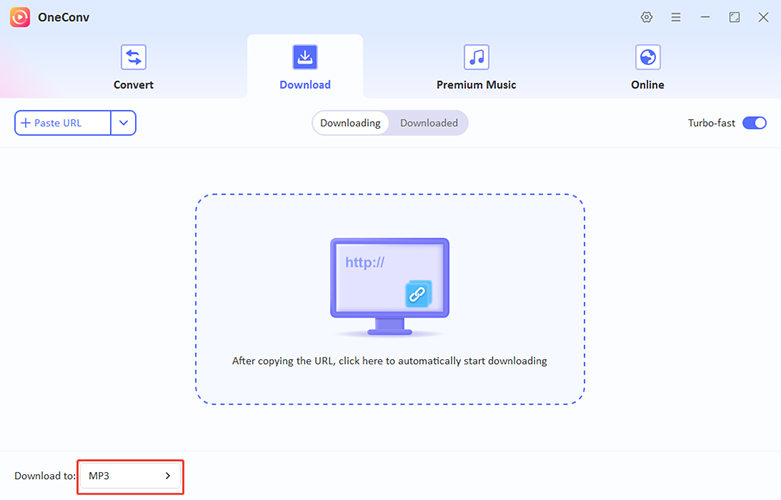
Step 3 Go to Tidal or Amazon Music, open the playlist you want to download, and copy the link from your browser or app.
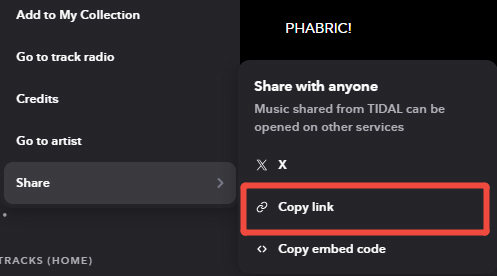
Step 4 Open OneConv, paste the copied link into the input field, hit ‘Download’ to start the process. Your playlist will be saved automatically.
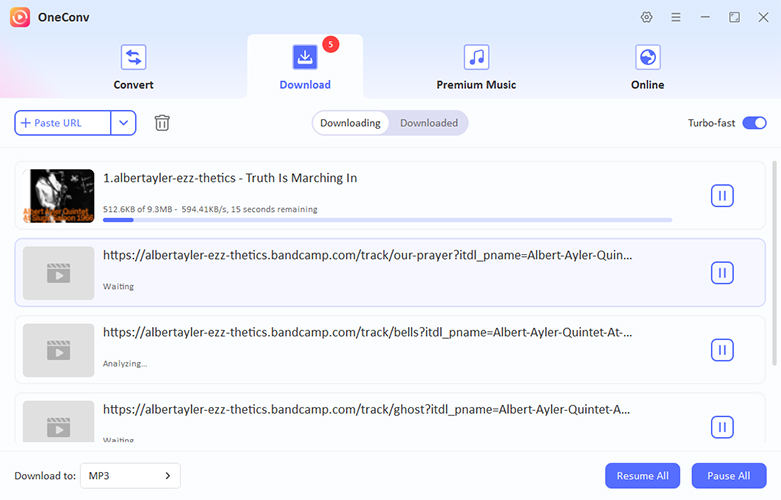
Step 5 Once finished, the MP3 files will appear in the app’s ‘Downloaded’ tab and are located at your chosen save folder.
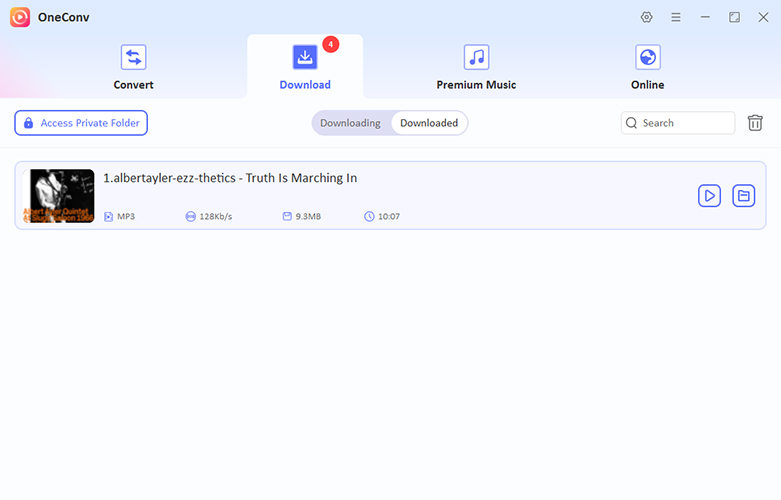
Conclusion: Which Should You Choose?
When comparing tidal vs amazon music, your choice depends on what matters most. Go for Tidal if you’re after top-notch audio, artist-focused tools, and exclusive drops. Choose Amazon Music for affordable high-res streaming, better Alexa integration, and perks for Prime users. No matter your pick, use OneConv Music Converter to save your favorite playlists easily in one click.